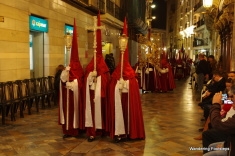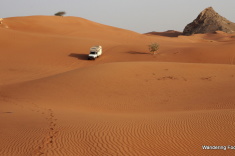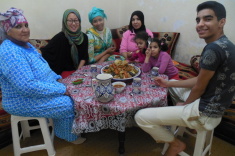It’s time I’m honest with you: travel isn’t always wonderful. Sometimes, it’s not amazing or awe-inspiring or any of the other synonyms listed in my thesaurus. Travel writers (myself included) are really good at making even mundane experiences seem legendary, but the truth is that sometimes traveling is just plain ok.
Rather than mislead you – as our guide book misled us – into thinking the Nkhotakota region of Malawi is a place of great natural beauty, friendly people, and historical significance, I’ve decided to be straight up with you. All things Nkhotakota disappointed us, save one.
Disappointment #1: Nkhotakota Wildlife Reserve
We arrived here with visions of lions dancing in our heads, for our Bradt guide had told us this was the last stronghold of lions in Malawi.
It wasn’t true, the lodge manager gently revealed. Though this reserve did boast the only permanent lion population in Malawi, that number was nowhere near the forty or fifty we’d come expecting. It was more around four or five.
“This park just can’t support more than a few lions. There’s nothing for them to eat,” he continued. It was true we hadn’t so much as seen a rustle in the bushes on our game drive, let alone an actual living ungulate. I suspected that was, yet again, because of the unchecked bush-meat trade in Malawi.
Sometimes an old male lion would be spotted as far as Mzuzu, 150km north of the reserve. It was likely kicked out of the pride, a burden on the group in a territory with such limited food supply. The male lion would pick off a goat here and there on his journey north for survival. But outside the reserve, things never ended well for him.
.jpg) |
| Crossing the bridge over the Bua River. |
.jpg) |
| The reception of Bua River Lodge at Nkhotakota Wildlife Reserve. |
With no lions – or game of any kind – to see, Nkotakota Wildlife Reserve was proving to be not much more than a really expensive campsite. The view of the nearby Bua River was obscured by thick bush, and was devoid of even the possibility of crocodiles, hippos, and elephants. What there were a lot of, however, were tiny flies that hovered mercilessly around my face and stuck to my eyelashes.
It was easy for us to decide to hit the road the following morning.
Disappointment #2: Nkhotakota Locals
We had taken the north road into the reserve and had enjoyed the picturesque views of villages and hills. Now, heading towards Nkhotakota town, we tried the southern track.
We were evidently not the first tourists to drive this way.
Everywhere we turned, children hopped out from bushes and ran out from their huts to accost us with cries of “Pen! Pen!” and “Give the money!” They opened their palms out to us or rubbed their fingers together to indicate their desire for our gifts. So many kids were closing in on us from every direction that I felt like we were in a video game trying to get past hungry zombies. A few zombies – I mean, kids – hooked themselves onto the bicycle on the back of our vehicle. When Bruno managed to shake them loose, the bike’s frame was bent.
Here was yet another example of the negative effects of tourism and the so-called generosity of tourists.
We were still feeling on edge as we rolled into the town of Nkhotakota. But since I’d been following in the footsteps of Dr. David Livingstone throughout Malawi, I wanted to stop here for another enlightening afternoon.
See, Nkhotakota was the port of the 19th century where legendary slave trader Jumbe had shipped 20,000 blacks annually across the lake into Tanzania. Nkhotakota was also the location of the infamous 1861 meeting between Jumbe and Livingstone, when the latter tried to convince the former to end his slave trading ways. It didn’t work, but the fig tree under which their meeting occurred is still standing as a landmark to this event.
.jpg) |
| The fig tree under which Livingstone attempted to convince Jumbe to stop trading slaves. |
There were another couple of notable sights in the town, such as the Bondo Mosque, a remnant of Jumbe’s Islamic Dynasty, and the Banda Tree, under which Malawi’s first black president held his notorious 1960 convention. I wanted to see these sights too, but our map wasn’t accurate and we ended up down a terrible dirt road that dead-ended in a field. It seemed there was a mosque beyond, so I got out to investigate on foot, but after being cat-called by a few local men and laughed at by the surrounding women, I gave up and hid in the car.
It seemed to me that the locals of Central Malawi weren’t quite as respectful as those of the north.
Disappointment #3: Nkhotakota Lakeshore
We headed for the beach south of town, yearning for another refreshingswim in Lake Malawi to wash away the disappointments of the last twenty-four hours.
Our exploratory walk around our stretch of lake seemed to indicate that that was not going to be possible.
 |
| The stretch of beach in front of Nkhotakota Safari Lodge. |
Bilharzia is always top on the traveler’s mind when deciding whether or not to swim in Lake Malawi. We’d always asked around before hopping into the lake, and once, the manager of a certain lodge, had broken it down for us:
“First of all,” he started, “it’s unfortunate that everyone associates bilharzia with Lake Malawi, and I blame the BBC.” According to him, some years back, the BBC had made a documentary on Lake Malawi, and for 55 minutes of the hour, it had shown the beauty and history of the lake in positive light. But just before the end, the camera scanned to the lake before zooming in on the reporter, who declared dramatically: “Unfortunately, this lake is unswimmable because of the horrendous bilharzia disease!”
Apparently, that had ruined Lake Malawi’s reputation.
“Bilharzia needs four things in order to be present: snails, cows, habitation, and stagnant water,” the lodge manager finished, satisfied that he had made his point. He had. At no time had we ever seen these four factors present at once on the lake. We swam worry-free in the lake thereafter.
But as we walked along Nkhotakota’s lakeshore, our worries returned. First, we spotted the cows, grazing along the beach. Then, we spotted the pools of stagnant water, separated only by a thin, impermanent wall of sand. Lastly, at the next bay we spotted the village, complete with a dirty beachside fish market, informal laundromat on the sand, and communal toilet in the water.
 |
| The fish market of the nearby village. |
 |
| Clothes being laid out to dry in between our lodge and the village. |
If ever there was to be bilharzia in Lake Malawi, it would be here. I looked at the deep blue water of the lake and the local children wading at its edge and knew I wasn’t going to risk it. There’d be no swimming for us in Nkhotakota. The mounting disappointments weren’t going to be washed away.
Forgetting Disappointment: Nkhotakota Pottery
I’d read in the guidebook that Nkhotakota was famous for its pottery, and that tourists could learn to be amateur potters here. No longer trusting my book, I expected this to be an expensive tourist trap that I wouldn’t get to participate in.
 |
| Ceramic pots for sale at the Nkhotakota Pottery and Lodge. |
 |
| Inquiring into pottery lessons. |
I was wrong! For only $4 an hour, I could take private pottery lessons! And for another $4, I could paint a ready-made mug, glaze and fire it, and take it home!
I took advantage of both offers. That first afternoon, I painted leopard print onto a mug. I laughed at myself as my poor painting skills manifested themselves on clay, but I had fun. The next morning, Bruno and I both [re]learned how to use a pottery wheel, and we played with gooey clay like two happy children.
 |
| Choosing the color scheme for my leopard-print mug. |
 |
| Painting [poorly]. |
 |
| Learning how to lift up my clay. |
 |
| “Ta-da! My clay is centered! I’m so good at pottery.” |
It seemed we had painted and potted our Nkhotakota disappointment away. With lighter spirits, we took another walk along the dirty beach, this time admiring the village scenes as we had when we’d first spotted Lake Malawi. We even made friends with a few naked village boys who’d come to beg money and pens from us.
 |
| Posing for photos and teaching the thumbs-up sign distracts little kids from begging for pens and spare change! |
 |
| Village life at the edge of Lake Malawi. |
Sat waiting on our camping table, upon our return, was a small item wrapped in newspaper and plastic. Surely, it was the leopard-print mug I’d so poorly painted. Expecting nothing, I slowly unwrapped the packaging. Somehow, the shine of the glaze and the heat of the fire had transformed the colors and pattern of the mug into something that looked, well, decent.
Blushing, I offered the gift to Bruno. That part had been planned. What hadn’t been planned was that the mug would be more than just a gift. It would be a symbol, too. A symbol of a lesson we had re-learned here in the region of Nkhotakota – that one about expectation leading to disappointment, and the pleasant surprises that arise when you don’t expect them.
The mug didn’t change our perception of Nkhotakota. Traveling here had still just been ok. But at least now we had something to remind us that even when travel isn’t amazing, it’s still edifying.
 |
| Bruno trying out his new leopard-print mug for the first time. The coffee tasted extra good….. growl! |



Brittany Sears - Thanks for reading Judith! You’re right about Paul Theroux’s negativity. I tried reading him ages ago, but put the book down as it was a little TOO pessimistic for me! Perhaps it would be worth having another go!
Judith Works - I appreciate this honest look at travel. Not all travel is idyllic and we need to remember this. Paul Theroux is a fine travel writer but always focuses on the down side (He was in the Peace Corps in Malawi).
Thanks for the infomative article.
Brittany Sears - Thanks a lot for writing, and for reading my blog! I’m glad grampa Les gave you my link.
As a matter of fact, we are hoping to head to Burundi, as we will soon be traveling North on Lake Tanganyika. Any advice on travel in your home country?
Anonymous - Hi Britanny.
Thanks for sharing your adventure and the beautiful pics you take. Your Grand Father Les is the one who talked to me about your blog. I told him that I am from a small country in Africa called Burundi and he was asking me if it was near victoria falls but told him that i finished my high school in Cape Town and i knew victoria falls as it is in Zimbabwe. Hope you enjoy the rest of your time in Africa and I will keep following up your blog.
Cedric B.
Moncton, New Brunswick